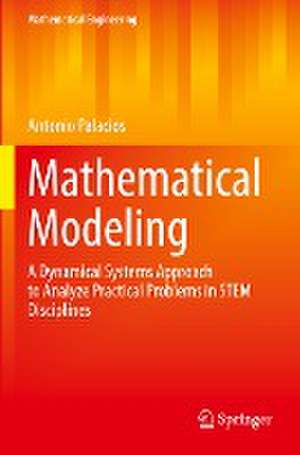Mathematical Modeling: A Dynamical Systems Approach to Analyze Practical Problems in STEM Disciplines: Mathematical Engineering
Autor Antonio Palaciosen Limba Engleză Paperback – 20 sep 2023
The book is intended for interdisciplinary scientists in STEM fields, who might be interested in learning the skills to derive a mathematical representation for explaining the evolution of a real system. Overall, the book could be adapted in undergraduate- and postgraduate-level courses, with students from various STEM fields, including: mathematics, physics, engineering and biology.
| Toate formatele și edițiile | Preț | Express |
|---|---|---|
| Paperback (1) | 597.99 lei 6-8 săpt. | |
| Springer International Publishing – 20 sep 2023 | 597.99 lei 6-8 săpt. | |
| Hardback (1) | 661.02 lei 6-8 săpt. | |
| Springer International Publishing – 20 sep 2022 | 661.02 lei 6-8 săpt. |
Din seria Mathematical Engineering
- 18%
 Preț: 1120.99 lei
Preț: 1120.99 lei - 17%
 Preț: 360.48 lei
Preț: 360.48 lei - 18%
 Preț: 1024.08 lei
Preț: 1024.08 lei - 5%
 Preț: 1156.98 lei
Preț: 1156.98 lei - 18%
 Preț: 992.34 lei
Preț: 992.34 lei - 17%
 Preț: 398.73 lei
Preț: 398.73 lei - 18%
 Preț: 783.98 lei
Preț: 783.98 lei - 18%
 Preț: 945.79 lei
Preț: 945.79 lei - 15%
 Preț: 644.82 lei
Preț: 644.82 lei -
 Preț: 390.08 lei
Preț: 390.08 lei - 18%
 Preț: 780.19 lei
Preț: 780.19 lei - 18%
 Preț: 728.28 lei
Preț: 728.28 lei - 15%
 Preț: 592.21 lei
Preț: 592.21 lei - 15%
 Preț: 643.84 lei
Preț: 643.84 lei -
 Preț: 367.15 lei
Preț: 367.15 lei - 18%
 Preț: 779.57 lei
Preț: 779.57 lei - 15%
 Preț: 643.00 lei
Preț: 643.00 lei - 15%
 Preț: 644.30 lei
Preț: 644.30 lei - 15%
 Preț: 636.63 lei
Preț: 636.63 lei - 15%
 Preț: 644.30 lei
Preț: 644.30 lei - 18%
 Preț: 948.29 lei
Preț: 948.29 lei - 15%
 Preț: 651.19 lei
Preț: 651.19 lei - 15%
 Preț: 644.95 lei
Preț: 644.95 lei - 18%
 Preț: 1118.75 lei
Preț: 1118.75 lei - 15%
 Preț: 647.73 lei
Preț: 647.73 lei - 18%
 Preț: 725.75 lei
Preț: 725.75 lei - 18%
 Preț: 783.98 lei
Preț: 783.98 lei - 18%
 Preț: 1111.53 lei
Preț: 1111.53 lei -
 Preț: 390.25 lei
Preț: 390.25 lei - 18%
 Preț: 780.19 lei
Preț: 780.19 lei - 18%
 Preț: 1112.78 lei
Preț: 1112.78 lei - 18%
 Preț: 952.26 lei
Preț: 952.26 lei - 18%
 Preț: 1001.81 lei
Preț: 1001.81 lei - 18%
 Preț: 780.68 lei
Preț: 780.68 lei - 15%
 Preț: 643.16 lei
Preț: 643.16 lei - 18%
 Preț: 729.53 lei
Preț: 729.53 lei - 18%
 Preț: 905.36 lei
Preț: 905.36 lei - 15%
 Preț: 641.20 lei
Preț: 641.20 lei - 15%
 Preț: 656.25 lei
Preț: 656.25 lei - 15%
 Preț: 650.37 lei
Preț: 650.37 lei - 18%
 Preț: 1001.65 lei
Preț: 1001.65 lei
Preț: 597.99 lei
Preț vechi: 703.51 lei
-15% Nou
Puncte Express: 897
Preț estimativ în valută:
114.43€ • 122.36$ • 95.41£
114.43€ • 122.36$ • 95.41£
Carte tipărită la comandă
Livrare economică 18 aprilie-02 mai
Preluare comenzi: 021 569.72.76
Specificații
ISBN-13: 9783031047312
ISBN-10: 3031047311
Pagini: 564
Ilustrații: XVII, 564 p. 238 illus., 144 illus. in color.
Dimensiuni: 155 x 235 mm
Greutate: 0.81 kg
Ediția:1st ed. 2022
Editura: Springer International Publishing
Colecția Springer
Seria Mathematical Engineering
Locul publicării:Cham, Switzerland
ISBN-10: 3031047311
Pagini: 564
Ilustrații: XVII, 564 p. 238 illus., 144 illus. in color.
Dimensiuni: 155 x 235 mm
Greutate: 0.81 kg
Ediția:1st ed. 2022
Editura: Springer International Publishing
Colecția Springer
Seria Mathematical Engineering
Locul publicării:Cham, Switzerland
Cuprins
Introduction- Algebraic Models.- Discrete Models.- Continuous Models.- Bifurcation Theory.- Network-Based Modeling.- Delay Models.- Spatial-Temporal Models.- Stochastic Models.- Model Reduction and Simplification.
Notă biografică
Antonio Palacios received his Ph.D. in Mathematics at Arizona State University under the guidance of Prof. Dieter Armbruster. He was a postdoctoral fellow in Physics at the University of Houston under the guidance of Prof. Michael Gorman and then in Mathematics under the supervision of Prof. Marty Golubitsky. He joined the Math Department at San Diego State University in 1999 and has been a full professor since 2008. His research interests are in modeling complex nonlinear systems. In particular, multidisciplinary nonlinear systems that interface with Biology, Engineering, and Physics. Over the past twenty years he has been collaborating with the Applied Chaos and Dynamics Group at the Space and Naval Warfare (SPAWAR) Center, San Diego to design and fabricate innovative technologies. Prof. Palacios's publications reflect a dual interest in Applied Mathematics and Engineering, linked through ideas and methods from the theory of Nonlinear Dynamical Systems. He holds thirteen approved U.S. Patents and two more pending.
Textul de pe ultima copertă
This book provides qualitative and quantitative methods to analyze and better understand phenomena that change in space and time. An innovative approach is to incorporate ideas and methods from dynamical systems and equivariant bifurcation theory to model, analyze and predict the behavior of mathematical models. In addition, real-life data is incorporated in the derivation of certain models. For instance, the model for a fluxgate magnetometer includes experiments in support of the model.
The book is intended for interdisciplinary scientists in STEM fields, who might be interested in learning the skills to derive a mathematical representation for explaining the evolution of a real system. Overall, the book could be adapted in undergraduate- and postgraduate-level courses, with students from various STEM fields, including: mathematics, physics, engineering and biology.
The book is intended for interdisciplinary scientists in STEM fields, who might be interested in learning the skills to derive a mathematical representation for explaining the evolution of a real system. Overall, the book could be adapted in undergraduate- and postgraduate-level courses, with students from various STEM fields, including: mathematics, physics, engineering and biology.
Caracteristici
Develops qualitative and quantitative methods to derive and solve mathematical models Covers a broad range of unique and interdisciplinary problems and examples Includes results from experiments that serve to validate the models
